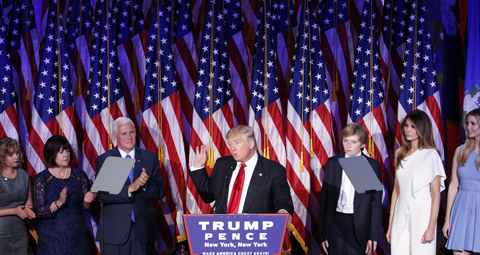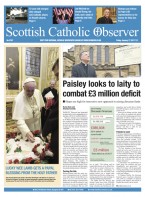January 27 | ![]() 0 COMMENTS
0 COMMENTS ![]() print
print

It’s time for us to proclaim the truth
We need to continue to reject falsehood and lies, even if it upsets the powerful in society
By Joseph McGrath
WELL, I’ve just about recovered from Christmas and New Year. I hope you have too. I really enjoyed Christmas this time. I found the liturgy very uplifting and I think it made me think about family.
Christmas is that kind of feast. This has been a strange Christmas. I could say 2016 has been a strange year. Looking back on it we might see it as the ‘post truth’ year.
Christmas has had a struggle to keep its identity. What we know as the birth of the Saviour has become a commercial binge time. We seem to have gone from giving simple gifts as a sign of our caring to running up debt to splash out on stuff nobody really needs.
Even here truth is being pushed out of the way. They even want to remove the word Christmas. They say we could be insulting people by wishing them ‘Happy Christmas.’ Well, I’ve been insulted from time to time but never by anyone wishing me well.
The New Year celebrations are a different thing. I suppose I’ve never really understood what there is to celebrate about getting older, counting off the years until it’s time to go. It’s the tradition of New Year resolutions that bother me.
The one good thing about this is being forced to have a look at your life and figure out what you should do to improve it. That’s not as easy as it sounds and keeping resolutions beyond the first week in January is even harder, but I’ll come back to that.
Both celebrations involve getting together with family. That always raises the question of who is your family. You may have family who live so far away you rarely see them. Weddings and funerals, that’s when you might catch up with them.
I have cousins I would not recognise if I met them in the street. That might be because they live on the other side of the world or maybe just the other side of Glasgow.
That brings me to something I noticed in the readings this year. In one Gospel reading I saw that John the Baptist did not recognise Jesus.
Seeing Jesus coming towards him, John said: “Look, there is the Lamb of God that takes away the sin of the world. This is the one I spoke of when I said: A man is coming after me who ranks before me because he existed before me. I did not know him myself, and yet it was to reveal him to Israel that I came Baptising with water.” (John 1:29, 34).
Now I’m not sure whether John did not recognise his cousin Jesus or had not recognised that he was the Messiah. I don’t suppose it matters since John had recognised that his role in life was to prepare the way of the Lord. He did this by preaching and Baptising.
John was popular among the people. He was not popular among those in authority. He was not popular among the powerful because by preaching simple truths he exposed the corruption at the heart of the authorities. That has a familiar feel to me.
I have recently felt that my religious views do not fit in with those in authority. My views on Christian marriage are deemed to be homophobic and one politician recently suggested that by not agreeing with the law of the land I must be breaking the law.
It seems to me that we are the problem because we look to an authority that is not the government, the press or the pundits. We look to God as the source of truth. That truth seems to be more and more in conflict with the law of the land. We Christians are a problem because we are casting doubt on the veracity of man-made laws. Who should we look to for the truth?
This is not a new problem. When Jesus stood before Pilate he made plain the place of truth.
I was born for this, I came into the world for this: to bear witness to the truth; and all who are on the side of truth listen to my voice.“Truth?” said Pilate. “What is that?” (John 18: 37, 38)
As Pilate showed by his question, truth and politics do not always mix. As we have seen recently that is often still the case. John recognised Jesus in his role a Messiah rather than a cousin. Some things are more important than blood ties. Our real family is God’s family. We call God Our Father and we refer to Mary as our mother. We are part of that family whose purpose is to bear witness to the truth.
In a sense we are to continue the work of John the Baptist in preparing the world to meet Jesus.
John the Baptist has been described as a wild-looking fellow with wild hair, dressed in animal skins and living in the desert foraging for food. He had removed himself from society and its trappings to point out where it was going wrong.
Now I have been described as a bit of a scruffy dresser. My hair, when I still had some, was never described as being stylish. I don’t think that puts me in the same class as John the Baptist but perhaps I should be taking a leaf out of his book.
It could be argued that rather than being annoyed by politicians rejecting my views, I should really be pleased. Perhaps I’m doing something right?
The past year has shown us politicians both here and in America making up truths as they went along. When challenged they rejected the idea that they should believe in truth but claimed that truth was what they believed. Commentators have pointed out that Donald Trump’s supporters accepted him because he said what they believed, whether there was any evidence to support it or not.
Who should we believe? Those who promise us hundreds of millions to be spent on the NHS every week rather than sending it to Europe (and then deny saying it), or Jesus who gave his life for the truth?
I think we now have a clear purpose. We should be proclaiming the truth to a society that seems to have lost the very concept of truth. We need to continue to reject falsehood and lies. We should be seen as the new John the Baptist.
Of course that will make us unpopular in official circles. We can take reassurance from that; Jesus said that the world hated him and so it will hate us too. The world crucified Jesus, so we must be doing something right if we are rejected too.
That might give me the answer to my New Year’s Resolution problem. I could resolve to be just like John the Baptist and insist on the truth, reject the lies our society increasingly relies on and take the consequences.
I won’t be moving out to the desert (some might suggest that Coatbridge is a good substitute) nor will I be dressing in animal skins. I wonder if we could make a difference. Perhaps if we habitually pointed out the truth when we are presented with lies the message might get through.











